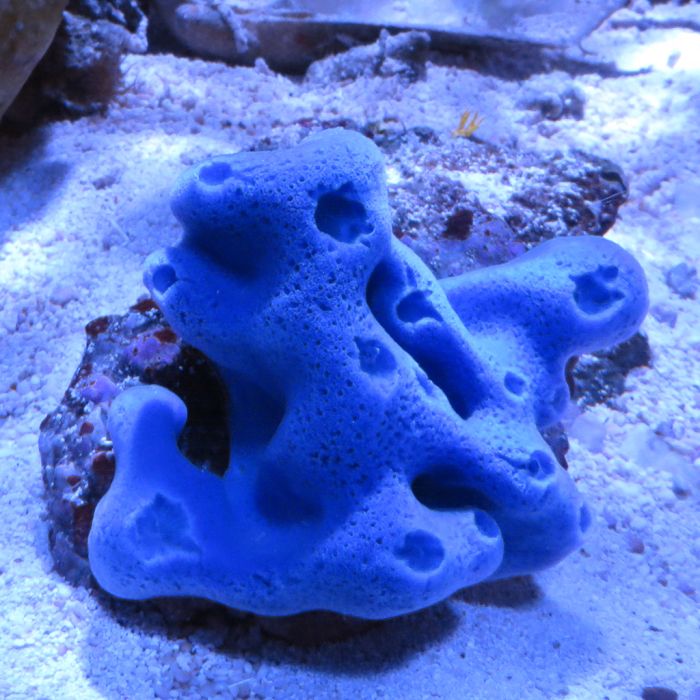Blue/Purple Sponge
This sponge comes in fantastic shades of azure to ultramarine, which are very rare hues on the reef. It has a rigid form resembling high volcanoes with oscula at the peak. It comes firmly attached to a piece of substrate.
This Sponge requires both light for energy and fine filter foods such as phyto and zooplankton, coral snow and small edible particles which may be found in mature aquariums. Occasionally stirring the sand may release some food items which the sponge may capture- most food utilized is 0.1-1.5 micrometers (typically 0.5 μm or smaller). Photosynthetic sponges utilize photosynthetic cyanobacteria or algae symbionts to generate energy from the light, and in return provide its symbionts with nitrogen. We recommend this animal only for expert aquarists who can provide for its needs.
Moderate to strong water flow is essential over all parts of the sponge. Lateral flow should be used, and never wave or surge action, or point-source powerheads, which may damage the animal’s delicate structure. Water flow will deliver food to the sponge and remove wastes, and also help to clear nuisance algae, cyanobacteria and debris. Sponge should never be exposed to air, as it will become trapped within the animal and cause starvation and necrosis. It should be transferred while underwater. If damage from trapped gasses affects the animal the damaged area should be cut away. Poor water quality is also not tolerated by sponges. It should be inspected for predatory nudibranch which may feed on it.
Many sponges are bright colors, which serves as a warning to predators that they contain toxins. These toxins help it to resist being overgrown by nuisance algae, however it may harm other aquarium inhabitants it touches, or be released into the water if the sponge is dead or dying. Demosponges such as this are comprised of silica spicules which may be extremely irritating if touched; wearing gloves or only handling the substrate they are attached to is recommended.
Sponges make excellent tank-mates with other filter-feeding creatures such as sun, flowerpot, carnation and chili corals, gorgonians, tunicates, clams and oysters which would also benefit from added food.
- Difficulty: Advanced
- Growth Speed: Slow
- Lighting: Medium - High
- Average Placement: Middle
- Water Flow: Medium - High
- Temperament: Peaceful

